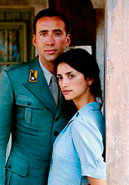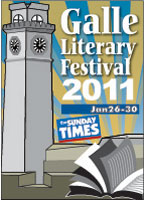Could he write a book that rivalled ‘War and Peace’? When Louis de Bernières published ‘Captain Corelli’s Mandolin’ in 1994, he was 40, nearly the same as age as Leo Tolstoy was when the latter released his iconic novel in 1869.
Though many tumultuous decades separated the two men, Louis’s ambition was to produce a novel that rivalled Tolstoy’s in its broad palette, its exquisitely drawn characters and its vivid depiction of a community in transition. But knowing so clearly what he wanted, meant that de Bernières also knew that he had failed. The novel that de Bernières describes as his “trial run” went on to win the Commonwealth Writers’ Prize for Best Book, was translated into 30 languages, made into a film starring Nicolas Cage and Penelope Cruz and then adapted to the stage as well.
It was with his fifth novel ‘Birds without Wings’ (2004), that de Bernières came closest to realising his dream – “I was trying to write a book that was about as many things as I could think of. I think that great literature is full of polarities – love and hate, shame and honour, courage and cowardice – which is what literature and therefore life is also about.” Ironically, the novel won no awards, but he didn’t need that validation. “I thought when I finished ‘Birds without Wings’ that that was the best I could do and in a way my literary life had ended.” Despite this, I wouldn’t write de Bernières off just yet – he says he has one more epic in him, and that Sri Lanka will find its way onto its pages.
In the country to attend the Galle Literary Festival 2011, de Bernières has brought his mother’s notebooks with him. Jean de Bernières never published a novel, but she attempted several short stories. Serving in the Royal Navy, she was based in Sri Lanka during the First World War, where as a signal officer she was involved in directing submarines in the Indian Ocean. Pulling out a slender notebook, Bernières reads the first line to me: ‘She stretched herself out luxuriously on the sand as she lay in the sun at Mount Lavinia.’ “It’s a Mills and Boon type of thing,” says de Bernières, smiling. He found the books while looking through her things after her death in November.
“She always talked about it, she always loved it here,” he says, adding that his mother’s only regret was that the European contingent had kept themselves so aloof from the local community. It was a mistake that you cannot imagine that de Bernières himself would ever make. In his novels, he gives entire countries the same painstaking attention as he does his characters and the author says that an essential part of his research involves long, rambling conversations. (Even at GLF, he was one of the few authors to simply sit and chat with fans at the cafe.) “I look for talkative people, I’ve learnt a lot about local history just by talking to local people,” he says, adding that when setting a book in a foreign locale “you want to know about customs and superstitions and what the food is like...you want to know what the place smells like, things like how do they make bread locally. I once saw a woman in Turkey make bread by spinning it on a stick.”
 |
| The author in Galle. Pic by Sanka Vidanagama |
With plans to stay on after the festival, de Bernières intends to discover Sri Lanka in a similar fashion. But he’s also going to be doing a lot more travelling for his new project. He describes it as a novel about the First World War that is in part a ghost story. Beginning in England, the action will move to Sri Lanka, then to the North West frontier of India, one of the central African countries like Tanzania, then onto Europe during the war, with a stopover in Germany before the war, finally culminating in the Rocky Mountains in Canada.
If it sounds large and unwieldy, it’s because it probably will be. ‘Birds without Wings’ certainly was – the sprawling novel is no easy read. But then de Bernières doesn’t believe in pandering to his readers. For many even ‘Captain Corelli’s Mandolin’, his most popular by far, proved something of a challenge. “In the first fifty pages of the novel you’re not quite sure where it’s going. One moment you’ve got Dr. Iannis on a Greek island and the next minute you have Mussolini ranting away and it takes awhile for the reader to find out how it all fits together and that is a bit frustrating, I can imagine,” he says, only to add unsympathetically “but I don’t want readers who can’t concentrate.”
Writing for de Bernières is itself an act of profound concentration. He says he loves how “that intense focus is such a relief from real life...it must be like what people are looking for when they meditate or even when they pray.” You need only read a de Bernières book to know that the author is having so much fun. (In ‘Birds without Wings’ he entertained himself by having Iskander the Potter reel off a few invented adages - ‘he who seeks the shade under the pines gets shat upon by doves.’) He doesn’t bother to discipline himself and only writes when he feels like it.
Should poverty ever loom on the horizon, though de Bernières says he will get right down to churning out a meretricious bestseller, if for no other reason than to avoid having to go back to teaching. Specialising in truants, de Bernières worked briefly “in a school for children who didn’t go to school,” and before that undertook various stints in the army, as a landscape gardener, motorcycle messenger and car mechanic, before he decided to go and teach English in Colombia. The experience inspired his first three novels, ‘The War of Don Emmanuel's Nether Parts’ (1990), ‘Señor Vivo and the Coca Lord’ (1991) and ‘The Troublesome Offspring of Cardinal Guzman’ (1992). Looking back, de Bernieres says “I have trouble imagining that I actually was that clever back then. It couldn’t have been me who wrote this, it’s too good.”
He abandoned magic realism in his latter novels, and Corelli’s proved a far more accessible read as De Bernières carried his gift for writing poetry into his prose, suffusing his novels with a deliberate lyricism even as he added political realism to create a heady brew. Set on the Greek island of Cephalonia during the Second World War, ‘Captain Corelli’s Mandolin’ told of how Pelagia, the daughter of a local doctor, fell in love with a mandolin toting Italian soldier named Corelli.
However, when the movie was made, fans of the book were almost unanimously united in their loathing of it. Commenting that the story “was changed in various irritating ways,” de Bernières says acidly, “film directors are like dogs, they don’t think it’s theirs until they’ve pissed on it.” Only one scene, the massacre of young Italian soldiers, passed muster. And of course, there was Penelope Cruz – “she was prepared to sit around drinking coffee with us while Nic Cage was shut in a caravan with black windows...I liked her so much that I couldn’t criticise her in any way.”
 |
| Penelope Cruz and Nicolas Cage starring in the film Captain
Corelli’s Mandolin |
Fortunately, de Bernières can shrug such disappointments off as he enjoys the luxury of indulging many passions. He is an accomplished classical guitarist and plays the flute and mandolin as well, often joining the Antonius Players on stage. His great pleasure, however, lies in restoring damaged instruments. Buying some for as cheap as five pounds, the author restores them to mint condition.
He’s come by his skills honestly – both his father and grandfather were good woodworkers. (He still has wooden toys that his grandfather made for him.) Few visitors have chance to appreciate the work though - De Bernieres’ is not one for glass displays, and says his collection of vintage instruments is stacked haphazardly in the dining room in his house in Norfolk, England. “My house is an appalling mess,” he confesses.
Today, with his success having guaranteed a previously undreamed of security, de Bernieres is also very clear on where his priorities lie. The author will be 57 this year, and if there is one thing he reserves his devotion for, it’s family - his aging father is the reason he hasn’t moved to Greece – and at this moment, he says “my consuming love is for my two little children.” Writing, however, will never be a hardship. “You know how some writers tell you how difficult and agonising it is and how much they would rather be doing something else? Well, either they’re lying or they really should be doing something else.” |




